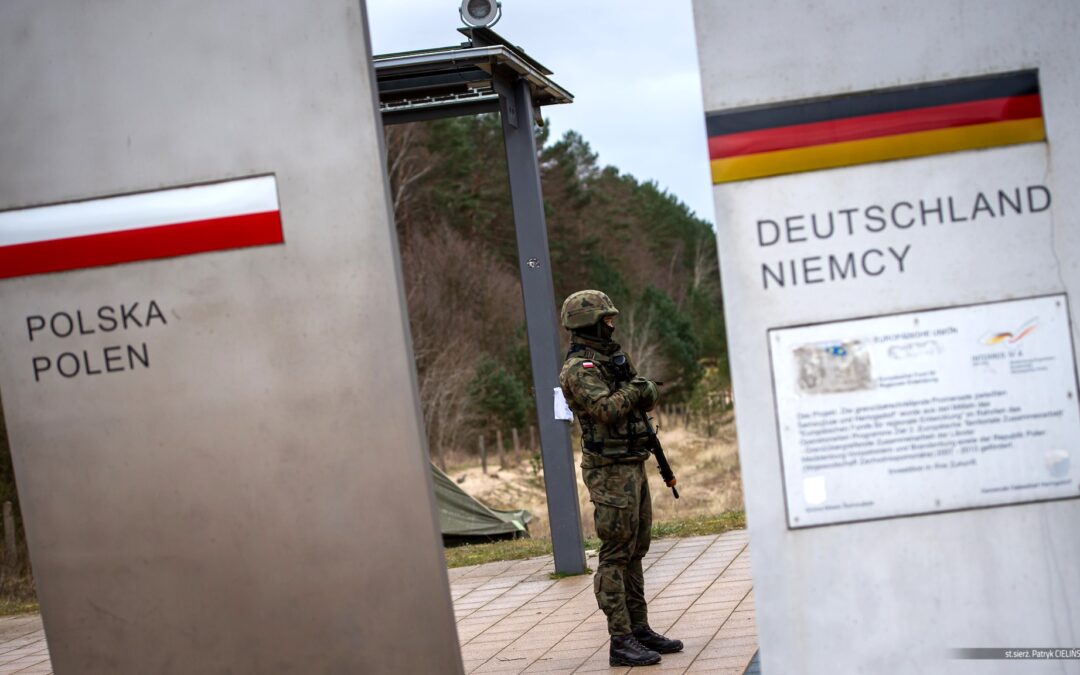The German states of Brandenburg and Saxony have called for the temporary re-introduction of controls on their borders with Poland and the Czech Republic in order to stem a surge in “irregular migration”. Currently, as members of the Schengen Area, Poland and Germany do not have border controls.
The request was made in a letter from the interior ministers of the two states – Armin Schuster of Saxony and Michael Stübgen of Brandenburg – to federal interior minister Nancy Faeser.
It comes ahead of a meeting tomorrow in Berlin between the heads of state governments and Chancellor Olaf Scholz to discuss sharing the burden of supporting refugees.
Innenminister wollen Grenzkontrollen zu Polen und Tschechien https://t.co/ncZDE8K8An pic.twitter.com/aqElcqEF91
— Berliner Morgenpost (@morgenpost) May 8, 2023
“Against the background of the migration situation on the borders of Brandenburg to Poland and Saxony to Poland and the Czech Republic, we wrote to the federal interior minister and asked for the temporary reintroduction of stationary internal border controls,” said Schuster, quoted by the Deutsche Presse-Agentur (dpa) news agency.
“If we want to maintain freedom of movement in the Schengen Area, we must prevent a loss of control at the federal border,” added Stübgen. “We therefore expect the federal government to immediately introduce stationary internal border controls and intensify its border protection measures.”
“The number of people arriving through irregular migration is increasing almost unabated,” added the pair in a joint statement. “If this development continues in the current year, the highest numbers since 2015/16 will be reached.”
Controls on Germany's border with Poland must be introduced to prevent a “collapse” like the one in 2015, the head of the German federal police union has warned
Thousands of people from the Middle East have been entering Germany from Belarus via Poland https://t.co/77ilGV6E4F
— Notes from Poland 🇵🇱 (@notesfrompoland) October 19, 2021
Between the start of March and mid-April this year, 3,093 illegal border crossings were detected at Germany’s border with Poland and 1,060 at the border with the Czech Republic, according to dpa, citing federal police data. Those figures are expected to increase further in the summer months.
Both Schuster and Stübgen are members of the centre-right Christian Democratic Union (CDU), which is currently the main national opposition after being ousted from government in 2021 by a coalition of Scholz’s Social Democratic Party (SDP), The Greens and the Free Democratic Party (FDP).
In their statement, they pointed to existing controls along the border with Austria in the southern state of Bavaria, which they considered to be effective in limiting the unauthorised entry of migrants.
The Polish-German border stretches for a total length of 467 km (290 miles), with the majority of that running along Brandenberg and Saxony.
A German woman has been banned from Poland for five years for violating a ban on entering the area on the border with Belarus where the government recently built an anti-migrant wall.
She was part of a group of activists passing packages through the wall https://t.co/xGJpXoqn2z
— Notes from Poland 🇵🇱 (@notesfrompoland) March 2, 2023
In 2021, tens of thousands of migrants and asylum seekers began attempting to cross into Poland over the border from Belarus, in a crisis engineered by the Belarusian authorities. Among those who managed to cross, most then sought to travel on to Germany, according to the Polish authorities.
In October of that year, the head of the German federal police union warned that the Polish-German border could “collapse” unless temporary controls were re-introduced.
However, Germany’s then interior minister, Horst Seehofer, said that no such measures were needed and thanked Poland for its efforts to prevent the flow of border crossers, saying that it was was “protecting our common external border” from the “hybrid threat” created by Belarus.
Since then, Poland has built a physical and electronic barrier along its border with Belarus to further stem crossings.
"The Poles have reacted correctly; they are doing a very important service for the whole of Europe," says Germany's interior minister amid a surge in attempted crossings from Belarus
He accused Russia of supporting Belarus's "hybrid threat" against the EU https://t.co/xzQa7yTS57
— Notes from Poland 🇵🇱 (@notesfrompoland) November 9, 2021
Main image credit: Combat Camera Poland/Flickr (under CC BY-NC 2.0)

Anna Hackett is an assistant editor at Notes from Poland. She is a recent graduate of European Studies from Trinity College Dublin and has had previous journalistic experience with the Irish Independent News & Media group.




















